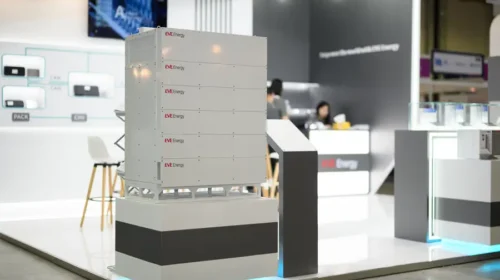Keytop seeks to turn China’s parking pain into opportunity

The provider of smart parking technologies wants to capitalize on a shortage of spaces in Chinese cities as it looks to go public in Hong Kong
Key Takeaways:
- Keytop has filed for a Hong Kong IPO, highlighting the money-making potential of its smart parking technologies in China’s congested cities
- The company’s revenue grew by an uninspired 8% last year, but it boasted a strong gross margin of about 46%
By Warren Yang
Parking can be a pain in cities, especially in China, where car ownership has only become common over the last two decades. Keytop Parking Inc. is looking to turn that to its advantage as it tries to find its own parking spot on the Hong Kong Stock Exchange.
That company, a provider of smart parking technologies, filed for a Hong Kong IPO last week, aiming to sell investors on its growth potential in a country that’s facing a shortage of parking spaces as a result of its rapid growth in car ownership.
Keytop looks like a compelling proposition for investors, even if the market for its products is still in its early stages. Its high-tech products are designed to help parking garage owners operate their spaces as efficiently as possible while easing pain points for drivers in everything from finding empty spots to paying fees. Such services make a lot of business sense in China as there is only one parking space available for every two vehicles on the road, according to third-party data cited in the company’s IPO lisiting document.
“This gap between supply and demand is a major factor contributing to urban parking difficulties for vehicle owners and drivers,” Keytop said. This situation has generated demand “for expanding parking infrastructure and optimizing the utilization efficiency of existing parking facilities, thereby propelling the development of the parking space operation industry in China.”
While Keytop’s parking proposition sounds good on paper, it also faces some obstacles due to the relatively high costs of its technologies. China’s ongoing real estate slump, and a sluggish economy in general, mean that many parking lot operators aren’t likely to want to rush to spend big sums on garage upgrades using Keytop’s products. That reality appears to be hamstringing the company’s growth. Its revenue increased just 8% to about 800 million yuan ($110 million) last year, slower than the 14% in 2023, though neither figure is likely to win Keytop any “hot company” awards.
But Keytop operates on nice margins that underpin its ability to make profits, something a lot of Chinese startups struggle to achieve. Its gross margin last year was about 46%, which ultimately cascaded into a net profit of 98 million yuan. The latest annual profit was down a bit from 2023, but that was mostly because of a decline in non-operational income, including government grants and compensation for early termination of a contract in 2023.
Keytop’s smart parking niche is relatively new, but the company itself has solid credentials in the parking industry. It was founded in 2006 as China’s first maker of LED indicators of parking space availability, according to its prospectors. Now, the company’s products are divided into three categories: smart solutions, smart services and smart operations.
Smart solutions comprise both hardware and software, using a range of technologies like internet of things, mobile payments, big data and artificial intelligence to make the parking process more efficient in facilities and on streets, and to make pedestrian management easier. Smart services are designed to automate the management of parking spaces, while smart operations offer technology-driven operational models for parking facility owners.
Smart solutions
Among those three segments, smart solutions are the company’s bread-and-butter, contributing about 60% of its revenue last year. Smart services accounted for the bulk of the remainder.
Keytop says demand for its products is bound to grow as inefficiently operated current parking garages and growing car ownership exacerbate the space shortage. Congestion in parking facilities not only creates stress for drivers but also hinders revenue generation for their owners or operators.
Reducing the time drivers stay in their vehicles to find empty spots can also help cut greenhouse gas emissions, a key focus area for Chinese policymakers. That’s an important factor for Keytop in a country like China, since it means the company can receive strong government support both financially and in the form of other incentives for companies that use its products and services.
Given all these factors, the size of the market for smart parking facility technologies in China is expected to zoom at a compound annual growth rate of 30% from 2024 to 2029 to hit 91.9 billion yuan, according to the company’s listing document.
The market may have good growth prospects, but it appears to be heavily congested with similarly minded companies, just like China’s parking lots. Keytop says it ranks second among smart parking companies in terms of revenue, but its market share is a mere 3%. Intensifying competition, which looks inevitable, could force the company to cut its prices and sacrifice its margins to defend its market position.
For companies operating in such emerging industries with new players constantly joining, especially in a technology-based one like smart parking, continual investment in new product development is critical. In this regard, extra capital from the Hong Kong IPO, if it succeeds, would be handy for Keytop, although it already generates positive cash flow from its operations.
It’s not clear how much the company is looking to raise at this point, but the share performance of Huachen AI Parking Management Technology (HCAI.US), a builder of automated parking garages that went public in New York in February, could help gauge investor interest in companies in this line of business.
Huachen raised just $6 million in gross proceeds from the offering after pricing its shares at $4 each, below the bottom end of its indicative range of $5 to $7. But the shares have performed nicely since their debut, nearly doubling to trade at a price-to-earnings (P/E) ratio of 76 and a price-to-sales (P/S) ratio of 4.
A similar P/S ratio would give Keytop a market capitalization of $440 million, based on its annual revenue for 2024, which would translate into a P/E ratio of about 32.
Keytop has better margins and more stable finances than Huachen, so it could command higher valuation multiples. The big question will be whether it can preserve its profitability while accelerating its growth in a competitive industry that’s closely tied to China’s real estate and auto sectors that aren’t going anywhere fast.
To subscribe to Bamboo Works weekly free newsletter, click here





